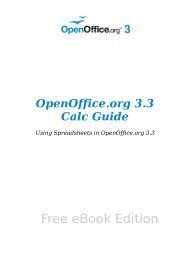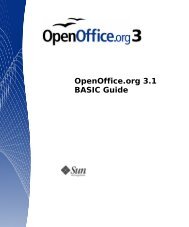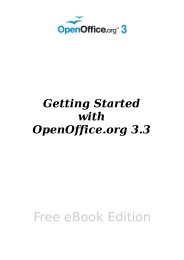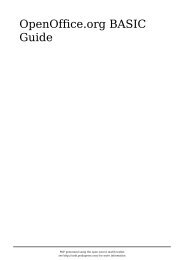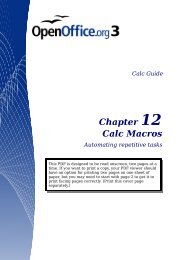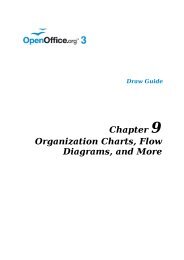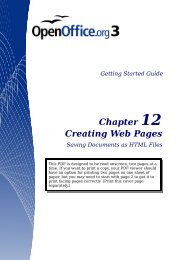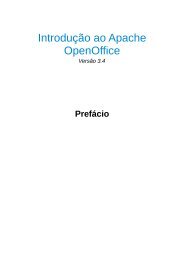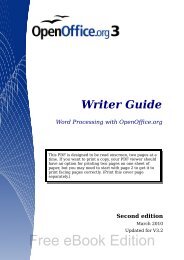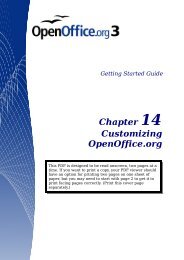OpenOffice.org BASIC Guide - OpenOffice.org wiki
OpenOffice.org BASIC Guide - OpenOffice.org wiki
OpenOffice.org BASIC Guide - OpenOffice.org wiki
Create successful ePaper yourself
Turn your PDF publications into a flip-book with our unique Google optimized e-Paper software.
Dim Replace As Object<br />
Dim BritishWords(5) As String<br />
Dim USWords(5) As String<br />
BritishWords() = Array("colour", "neighbour", "centre", "behaviour", _<br />
"metre", "through")<br />
USWords() = Array("color", "neighbor", "center", "behavior", _<br />
"meter", "thru")<br />
Doc = ThisComponent<br />
Replace = Doc.createReplaceDescriptor<br />
For I = 0 To 5<br />
Replace.SearchString = BritishWords(I)<br />
Replace.ReplaceString = USWords(I)<br />
Doc.replaceAll(Replace)<br />
Next I<br />
Editing Text Documents<br />
The expressions for searching and replacing are set using the SearchString and ReplaceString properties of<br />
the ReplaceDescriptors. The actual replacement process is finally implemented using the replaceAll<br />
method of the document object, which replaces all occurrences of the search expression.<br />
Example: searching and replacing text with regular expressions<br />
The replacement function of <strong>OpenOffice</strong>.<strong>org</strong> is particularly effective when used in conjunction with regular<br />
expressions. These provide the option of defining a variable search expression with place holders and special<br />
characters rather than a fixed value.<br />
The regular expressions supported by <strong>OpenOffice</strong>.<strong>org</strong> are described in detail in the online help section for<br />
<strong>OpenOffice</strong>.<strong>org</strong>. Here are a few examples:<br />
A period within a search expression stands for any character. The search expression sh.rt therefore can stand<br />
for both for shirt and for short.<br />
The character ^ marks the start of a paragraph. All occurrences of the name Peter that are at the start of a<br />
paragraph can therefore be found using the search expression ^Peter.<br />
The character $ marks a paragraph end. All occurrences of the name Peter that are at the end of a paragraph<br />
can therefore be found using the search expression Peter$.<br />
A * indicates that the preceding character may be repeated any number of times. It can be combined with the<br />
period as a place holder for any character. The temper.*e expression, for example, can stand for the<br />
expressions temperance and temperature.<br />
The following example shows how all empty lines in a text document can be removed with the help of the regular<br />
expression ^$:<br />
Dim Doc As Object<br />
Dim Replace As Object<br />
Dim I As Long<br />
Doc = ThisComponent<br />
Replace = Doc.createReplaceDescriptor<br />
Replace.SearchRegularExpression = True<br />
Replace.SearchString = "^$"<br />
Replace.ReplaceString = ""<br />
Doc.replaceAll(Replace)<br />
More Than Just Text<br />
So far, this chapter has only dealt with text paragraphs and their portions. But text documents may also contain<br />
other objects. These include tables, drawings, text fields and directories. All of these objects can be anchored to<br />
any point within a text.<br />
Thanks to these common features, all of these objects in <strong>OpenOffice</strong>.<strong>org</strong> support a common basic service called<br />
com.sun.star.text.TextContent. This provides the following properties:<br />
Chapter 6 · Text Documents 81



